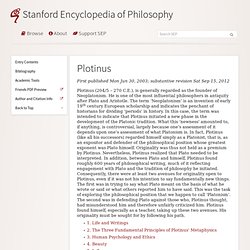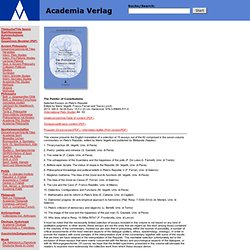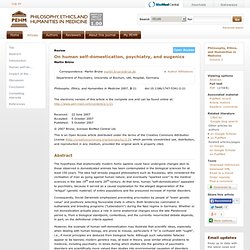

Plotinus. First published Mon Jun 30, 2003; substantive revision Sat Sep 15, 2012 Plotinus (204/5 – 270 C.E.), is generally regarded as the founder of Neoplatonism.

He is one of the most influential philosophers in antiquity after Plato and Aristotle. The term ‘Neoplatonism’ is an invention of early 19th century European scholarship and indicates the penchant of historians for dividing ‘periods’ in history. In this case, the term was intended to indicate that Plotinus initiated a new phase in the development of the Platonic tradition. What this ‘newness’ amounted to, if anything, is controversial, largely because one’s assessment of it depends upon one's assessment of what Platonism is. 1. Owing to the unusually fulsome biography by Plotinus' disciple Porphyry, we know more about Plotinus' life than we do about most ancient philosophers'. Plotinus was born in Lycopolis, Egypt in 204 or 205 C.E. Porphyry's biography reveals a man at once otherworldly and deeply practical. Vegetti, Mario. Essays on Plato's Republic. The Painter of Constitutions.

Selected Essays on Plato's Republic.Edited by Mario Vegetti, Franco Ferrari and Tosca Lynch.2013. 348 S. 54,00 Euro. 15,5 x 23 cm. Hardcover. 978-3-89665-511-0. (International Plato Studies Bd. 32) Inhaltsverzeichnis/Table of content (PDF) Textauszug/Browse content (PDF) Prospekt (Druckversion/PDF) / Information leaflet (Print version/PDF) This volume presents the English translation of a selection of 15 essays out of the 82 comprised in the seven-volume commentary on Plato's Republic, edited by Mario Vegetti and published by Bibliopolis (Naples). 1. 2. 3. 4. 5. 6. 7. 8. 9. 10. 11. 12. 13. 14. 15. It must be noted that the necessarily limited selection of essays included in this volume is not based on any kind of qualitative judgment: in other words, these essays are not the ones that we regard as 'the best' among those contained in the volumes of the commentary.
Mario Vegetti is emeritus professor at the University of Pavia. 33 · De Brasi, Diego. The body: toward an Eastern mind-body theory - Yasuo Yuasa, Thomas P. Kasulis. On human self-domestication, psychiatry, and eugenics. Charles Darwin was the first to systematically examine biological changes in species under artificial breeding conditions.

Even though he did not refer to the question of human self-domestication in his two volumes on Variations of Animals and Plants under Domestication [2], Darwin proposed clear definitional criteria for the process of domestication. He emphasised (1) that the domestication of animals is more than taming, (2) that it represents a goal-oriented process for human purposes, (3) that the variability of physical and 'mental' characteristics is greater in domesticated species than in their wild ancestors, including the occurrence of dwarfism and gigantism, (4) that the behavioural plasticity and educability of domesticated species is greater, and (5) that the brain size of domesticated animals is smaller than that of their wild ancestors'. In the biological literature following Darwin, the term "domestication" became increasingly poorly defined.
Body and brain: a trophic theory of neural connections - Dale Purves.